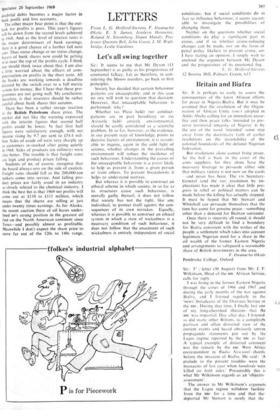LETTERS
From L. G. Holford-Stevens, F. 1 heanacho Okole, E. S. James, Jossleyn Hennessy, Roland N. Stromberg, Shaun Mandy, Pro- fessor Quentin Bell, John Guest, J. Al. Wall- bridge, Leslie Gardiner.
Let's all swing together
Sir: It seems to me that Mr Dyson (13 September) is as guilty as his progressives of emotional fallacy. Let us therefore, in con- sidering the Moors murders, go back to first principles.
Society has decided that certain behaviour patterns are unacceptable; and in this case no one will wish to question that decision. However, that unacceptable behaviour is performed; why'?
Whether (as Plato held) our conduct- patterns are in part hereditary or (as Aristotle held) entirely environmental, should be coolly considered as a scientific problem. In so far, however, as the evidence, in our present state of knowledge, points to decisive factors of environment, it is reason- able to inquire, again in the cold light of science, whether changes in the prevailing environment will reduce the incidence of such behaviour. Understanding the causes of the unacceptable behaviour is a priori likely to help us prevent it, from a given person or from others. To prevent breakdowns it helps to understand motives.
But whereas it is possible to construct an ethical scheme in which society, in so far as its structures cause such behaviour, is morally guilty thereof, it does not follow that society has not the right, like any individual, to protect itself against the con- sequences of its own mistakes. Equally, whereas it is possible to construct an ethical system in which a state of wickedness is a necessary condition of such behaviour, it does not follow that the enactment of such wickedness is entirely independent of social conditions; but if social conditions do in fact so influence behaviour, it seems reason- able to investigate the possibilities of changing them.
Neither on the questions whether social conditions do play a significant part in crime, and if so whether crime-reducing changes can be made. nor on the form of penal policy likeliest to prevent crime, am I here stating an opinion; I simply wish to uncloud the argument between Mr Dyson and the progressives of its emotional fog. L. G. Hollord-Stevens 12 Bourne Hill, Palmers Green, N13








































 Previous page
Previous page